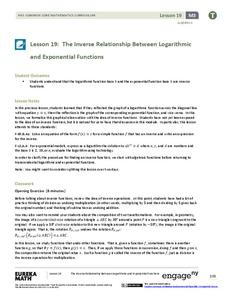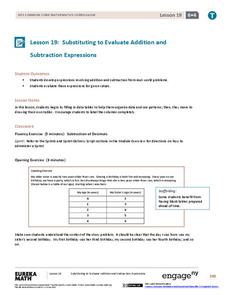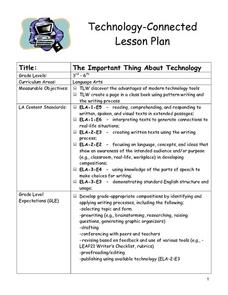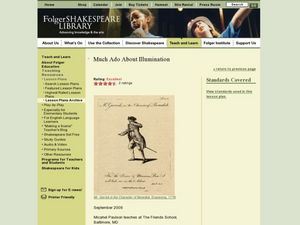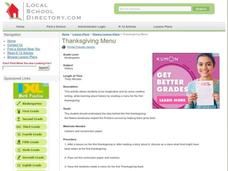EngageNY
The Inverse Relationship Between Logarithmic and Exponential Functions
Introducing inverse functions! The 20th installment of a 35-part lesson encourages scholars to learn the definition of inverse functions and how to find them. The lesson considers all types of functions, not just exponential and...
EngageNY
Solving Exponential Equations
Use the resource to teach methods for solving exponential equations. Scholars solve exponential equations using logarithms in the twenty-fifth installment of a 35-part module. Equations of the form ab^(ct) = d and f(x) = g(x) are...
EngageNY
Determining the Equation of a Line Fit to Data
What makes a good best-fit line? In the 10th part of a 16-part module, scholars learn how to analyze trend lines to choose the best fit, and to write equations for best-fit lines to make predictions.
EngageNY
Interpreting and Computing Division of a Fraction by a Fraction—More Models II
No more inverting and multiplying to divide fractions. Applying concepts of measurement division from the previous lesson, pupils consider partitive division using fraction bars and number lines. They first convert fractions to like...
EngageNY
The Division Algorithm—Converting Decimal Division into Whole Number Division Using Mental Math
Make math much simpler with mental math methods. The 16th installment in a series of 21 looks at ways scholars can apply mental math to convert division problems into easier problems with the same quotient. Multiplying or dividing both...
EngageNY
Ordering Integers and Other Rational Numbers II
Individuals build on prior knowledge to order a set of rational numbers from least to greatest or greatest to least. As part of the lesson, they order rational numbers written in different forms.
EngageNY
Substituting to Evaluate Addition and Subtraction Expressions
Substitute this resource for what you used to use. Learners identify patterns in data tables and write addition and subtraction expressions to represent relationships. Substitution allows them to solve problems in context in the 20th...
Curated OER
Reading Poetry in the Middle Grades
Bring the beauty of "Nothing Gold Can Stay" by Robert Frost to middle school language arts. After learners read a copy of the poem, they follow an instructional sequence that focuses on sound, figurative language, and theme.
Anti-Defamation League
10 Ideas for Teaching Black History Month
Celebrate Black History Month with the help of 10 ideas that delve deep into the history, major events, contributions, famous African Americans, and sheds light on how scholars today can take a proactive stance on current civil rights...
EngageNY
Introduction to Simultaneous Equations
Create an understanding of solving problems that require more than one equation. The lesson plan introduces the concept of systems of linear equations by using a familiar situation of constant rate problems. Pupils compare the graphs of...
Curated OER
Those Fabulous Fables
A video leads off this activity on fables, introducing the class to this important form of traditional storytelling. The group defines fable and hears an explanation of the origin of this type of folk tale. They summarize the story they...
EngageNY
Solving Percent Problems
Don't discount how much your pupils understand percents! The 27th lesson in a series of 29 presents a problem to find the cost of a discounted outfit. Small groups determine either the original price or the discount received given the...
EngageNY
Comparing Ratios Using Ratio Tables
Decide which concentration of mixtures is the strongest. Pupils use tables to compare ratios involved in mixtures. They use two methods to make the comparisons — by finding equivalent values within the tables or by comparing the...
Curated OER
Marketing to Teens: Parody Ads
High schoolers deconstruct advertising messages by analyzing parody ads and exploring the purpose of satire. Then they create their own parodies based on real ads discussed in class. A creative activity to extend any study of media,...
Curated OER
Character in a Box
Partners choose, research, and analyze fictional or historical characters and design character life boxes to represent them. They also compose a rhyme royal, which they understand inductively by deconstructing examples. Based largely on...
Learning for Justice
Recognizing Discrimination
Empower scholars to take a peaceful stand against discrimination. The color of their clothes separates learners; then, only some are allowed to go to recess—this sparks a discussion about the concept of discrimination and how they felt...
Curated OER
Adjective Monster
Explore descriptive writing and visual art. Listen to the story Go Away Big, Green Monster by Ed Emberley and generate a list of adjectives used in the book. Name familiar shapes and create a shapes list. Choose an adjective and shape to...
Curated OER
American Civil Rights Movement, Photo Essay
Learners view photographs from the Civil Rights Movement and write an essay from the point of view of someone in the photograph. They artistically represent various aspects of the Movement.
Curated OER
The Important Thing About Technology
Students assess the advantages of modern technology tools by creating a page in a class book utilizing pattern writing as well as the writing process. They organize and develop a composition on a selected topic after going through the...
Curated OER
Much Ado About Illumination
Students analyze the language and characters in the Shakespeare play, Much Ado About Nothing. In this Shakespeare play lesson, students read section of the play and discuss the speech of Benedick and Claudio. Students record the speech...
Curated OER
Imagining Back Story: Creating an Artifact for an Extra-Extended Text
Students create a "back story" for a character from Measure for Measure. In this Measure for Measure lesson, students read the text closely as they look for clues about where the character came from and how he or she became what...
Curated OER
Cinderella Stories
Students explore their creative writing skills. In this Cinderella writing lesson, students compare perspective as they read and discuss 2 versions of the "Three Little Pigs." Students then watch "Cinderella" and use their creative...
Curated OER
Thanksgiving Menu
Pupils explore the First Thanksgiving. In this U.S. history lesson, students read about the Pilgrims and Native Americans and discuss how they obtained and prepared food. Pupils develop a possible first Thanksgiving menu and draw a...
Curated OER
Whose Voice Do I Hear?
Fifth graders examine the power of voice in writing by completing a story using words following a particular voice. They take simple nursery rhymes, then attempt to put their own voice to a revised version. An interesting lesson on writing!
